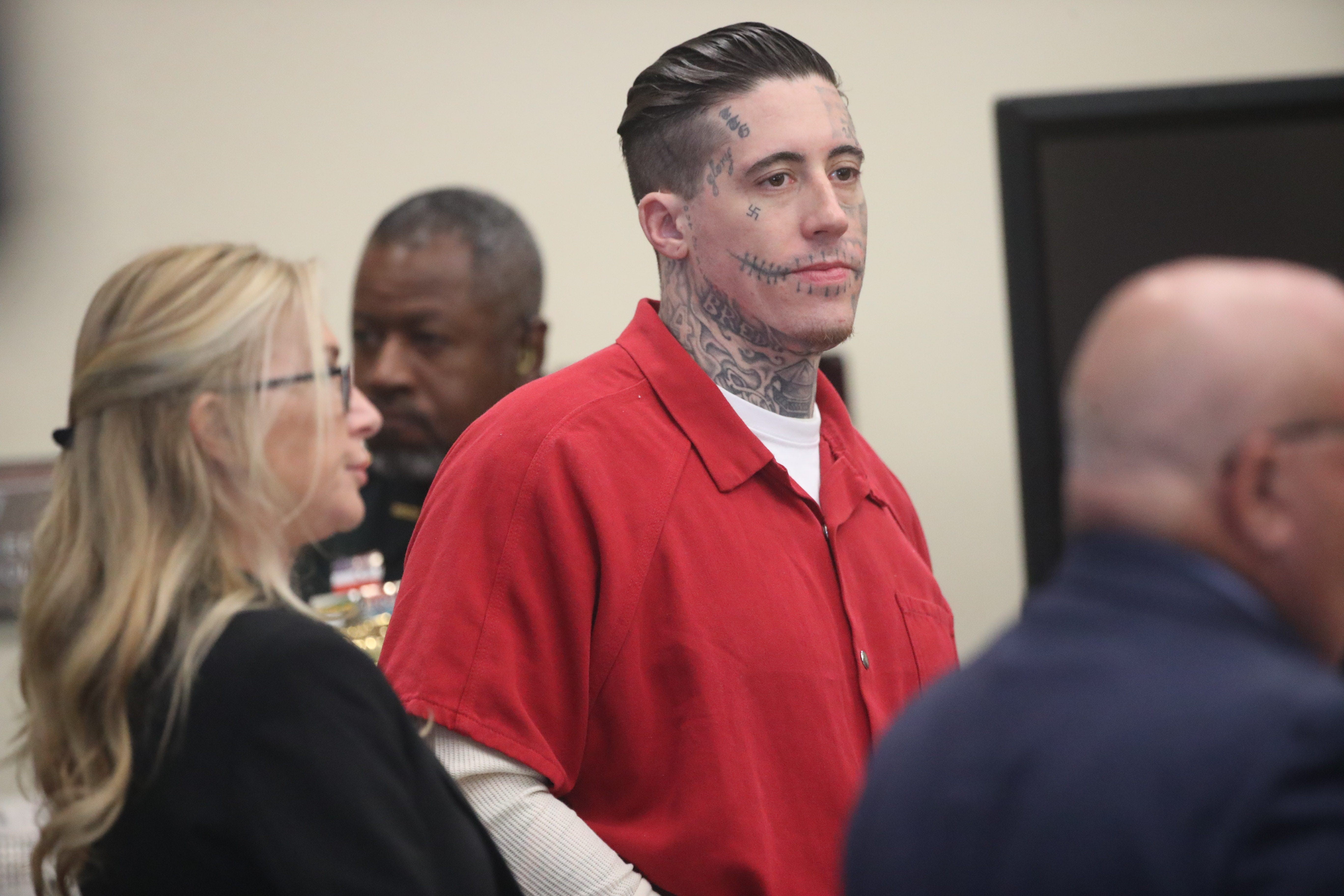Why Did Wade Wilson Kill The Two Women? This is a question on many minds, and WHY.EDU.VN is here to provide a comprehensive answer. Examining the motives and details of this heinous crime sheds light on the tragic events and the factors that led to it, explore criminal psychology and legal implications. For deeper insights, consider exploring topics like forensic analysis and mental health evaluations.
1. The Heinous Crimes of Wade Wilson: An Overview
Wade Wilson, a 30-year-old man, was convicted and sentenced to death for the brutal murders of Kristine Melton, 35, and Diane Ruiz, 43, in Cape Coral, Florida, in October 2019. The crimes were characterized by their heinous nature and the seemingly senseless violence inflicted upon the victims. The prosecution argued that Wilson committed these acts “for the sake of killing,” a chilling motive that underscores the severity of his actions. The case garnered significant attention due to the brutality of the crimes and the unsettling details that emerged during the trial. The victims’ families and the community were left devastated by the senseless loss of life.
1.1. Details of the Murders
The sequence of events leading to the deaths of Kristine Melton and Diane Ruiz reveals a disturbing pattern of violence and disregard for human life. According to the prosecutors, Wilson first strangled Kristine Melton in her home following a drug-fueled sexual encounter. He then stole her car and used her phone to contact his girlfriend, Melissa Montanez, whom he assaulted, but she resisted getting into the car. Subsequently, Wilson encountered Diane Ruiz, who was seeking directions. He invited her into the stolen vehicle, only to later strangle her. After disposing of her body, he ran her over multiple times with the car, causing horrific injuries. The details of these murders paint a grim picture of Wilson’s actions and the extreme violence he inflicted upon his victims.
1.2. Legal Proceedings and Sentencing
Following his arrest, Wade Wilson faced trial and was found guilty of first-degree murder for both deaths. The jury recommended the death penalty, and Judge Nicholas Thompson, presiding over the case, found no reason to overrule their recommendation, describing the murders as “heinous, atrocious and cruel” and noting that the second murder was “cold, calculated and premeditated.” The judge’s decision to impose the capital sentence reflected the severity of the crimes and the lack of mitigating factors that could justify a lesser punishment. The legal proceedings underscored the gravity of Wilson’s actions and the justice system’s response to such heinous crimes.
2. The Victims: Kristine Melton and Diane Ruiz
Kristine Melton, 35, and Diane Ruiz, 43, were the victims of Wade Wilson’s violent acts. Their lives were tragically cut short, leaving behind grieving families and communities. Understanding who they were provides a crucial perspective on the impact of Wilson’s crimes.
2.1. Kristine Melton: Background and Circumstances
Kristine Melton’s life ended tragically after a drug-fueled encounter with Wade Wilson. Few details about her personal life were released during the trial, but it’s clear that she was a valued member of her community. Her murder sent shockwaves through Cape Coral, highlighting the vulnerability of individuals and the potential for violence to disrupt lives unexpectedly. Melton’s family and friends mourned her loss, remembering her as a person whose life was unfairly taken. The circumstances surrounding her death underscore the dangers associated with drug use and the potential for interactions to turn violent.
2.2. Diane Ruiz: A Chance Encounter Turns Deadly
Diane Ruiz’s encounter with Wade Wilson was a tragic case of being in the wrong place at the wrong time. Seeking directions in Cape Coral, she accepted a ride from Wilson, unaware of the danger she was in. Her murder was particularly brutal, as Wilson not only strangled her but also ran her over repeatedly with the car. Ruiz’s death underscored the randomness of violence and the devastating consequences of chance encounters with dangerous individuals. Her family and community mourned the loss of a person who was simply seeking help and whose life was senselessly taken.
3. Wade Wilson: Unraveling the Mind of a Killer
Understanding why Wade Wilson committed such brutal acts requires delving into his background, psychological state, and potential motivations. Examining these aspects can provide insights into the factors that may have contributed to his violent behavior.
3.1. Background and Upbringing
Wade Wilson’s background includes being given up for adoption by his biological parents, which his attorneys argued led to abandonment issues. His adoptive parents pleaded with the court to spare his life, suggesting that there was still a human element within him. However, his troubled past does not excuse his heinous crimes, but it offers a glimpse into potential factors that may have influenced his behavior. The complexities of his upbringing and the potential psychological impact of abandonment could have contributed to his instability and violent tendencies.
3.2. Psychological State and Mental Health
During the trial, Wilson’s attorneys argued that he suffered brain damage from drug addiction, which may have impaired his judgment and impulse control. While this claim was not accepted as a mitigating factor by the court, it raises questions about his mental state at the time of the murders. The intersection of drug addiction and potential brain damage could have significantly impacted his ability to control his actions and understand the consequences of his violence. Further psychological evaluations might have provided additional insights into his mental state, but ultimately, he was deemed responsible for his actions.
3.3. Potential Motivations: “Killing for the Sake of Killing”
The prosecution argued that Wade Wilson’s motive was “killing for the sake of killing,” suggesting a deep-seated desire to inflict violence without any rational explanation. This chilling motive implies a lack of empathy and a disturbing disregard for human life. Such a motivation is indicative of severe psychological issues and a profound disconnect from societal norms. The idea that someone could commit such heinous acts simply for the act of killing is deeply unsettling and underscores the need for understanding and addressing the root causes of violent behavior.
4. The Role of Substance Abuse
Substance abuse played a significant role in the events leading to the murders. Wade Wilson’s drug use, particularly his drug-fueled encounter with Kristine Melton, was a key factor in the initial crime.
4.1. Drug-Fueled Encounter with Kristine Melton
The prosecution stated that Wade Wilson strangled Kristine Melton after they had a drug-fueled sexual encounter. This suggests that drugs may have impaired his judgment and fueled his aggression. The combination of drugs and sexual activity could have created a volatile situation in which Wilson’s inhibitions were lowered, and his propensity for violence was heightened. The role of substance abuse in this instance highlights the dangers of drug use and the potential for it to contribute to violent crime.
4.2. Impact on Judgment and Aggression
Wade Wilson’s attorneys argued that his drug addiction led to brain damage, further impacting his judgment and control. While this was not accepted as a mitigating factor, it raises the possibility that his substance abuse may have contributed to his violent behavior. Drug addiction can alter brain chemistry and impair cognitive functions, leading to increased impulsivity and aggression. The potential impact of substance abuse on Wilson’s mental state underscores the complexities of the case and the challenges of understanding the motivations behind his heinous actions.
5. Public and Media Reaction
The Wade Wilson case garnered significant public and media attention due to the brutality of the murders and the unsettling details that emerged during the trial. The public reaction was one of shock, horror, and a demand for justice.
5.1. Media Coverage and Public Outcry
The media extensively covered the Wade Wilson case, reporting on the details of the murders, the legal proceedings, and the sentencing. The public outcry was palpable, with many expressing outrage and demanding that Wilson be held accountable for his actions. The media coverage helped to raise awareness about the case and ensure that justice was served for the victims and their families. The public’s reaction reflected a deep sense of revulsion at the senseless violence and a desire to see the perpetrator punished to the fullest extent of the law.
5.2. Letters to the Judge: Support and Condemnation
During the trial, the judge received numerous letters from the public, some condemning Wade Wilson and urging the court to impose the death penalty, while others pleaded for leniency, citing his troubled past and potential for rehabilitation. Some of these letters even included X-rated photos and professions of love, which underscored the disturbing fascination some individuals have with criminals. The diverse range of opinions reflected the complexities of the case and the varying perspectives on justice, punishment, and the potential for redemption.
6. Legal and Ethical Considerations
The Wade Wilson case raises several legal and ethical considerations, including the death penalty, mental health defenses, and the responsibility of the justice system to balance punishment with potential rehabilitation.
6.1. The Death Penalty Debate
The imposition of the death penalty in the Wade Wilson case sparked debate about the morality and efficacy of capital punishment. Some argue that the death penalty is a just punishment for heinous crimes, while others believe it is a cruel and unusual punishment that should be abolished. The debate over the death penalty raises fundamental questions about justice, retribution, and the value of human life. The Wade Wilson case served as a focal point for this ongoing debate, highlighting the complexities and ethical dilemmas associated with capital punishment.
6.2. Mental Health Defenses and Criminal Responsibility
The defense’s attempt to argue that Wade Wilson suffered brain damage from drug addiction raises questions about the role of mental health in criminal responsibility. While the court did not accept this as a mitigating factor, it underscores the challenges of determining when mental illness or impairment should excuse or mitigate criminal behavior. The legal system grapples with the complexities of assessing mental capacity and holding individuals accountable for their actions while also recognizing the potential impact of mental health issues on their behavior. The Wade Wilson case highlighted the need for careful consideration of mental health defenses and the importance of ensuring that justice is served fairly and equitably.
7. Lessons Learned and Preventative Measures
The Wade Wilson case offers several lessons about the intersection of violence, substance abuse, and mental health. It also underscores the need for preventative measures to address these issues and reduce the risk of similar tragedies.
7.1. Addressing Substance Abuse and Mental Health
The Wade Wilson case highlights the importance of addressing substance abuse and mental health issues. Providing access to treatment and support services can help prevent individuals from spiraling into addiction and violence. Early intervention and comprehensive care are crucial for addressing the root causes of these issues and promoting positive outcomes. The case serves as a reminder that substance abuse and mental health are significant public health concerns that require a multifaceted approach involving prevention, treatment, and support.
7.2. Community Safety and Awareness
Promoting community safety and awareness can help prevent future tragedies. Educating the public about the dangers of drug use, the warning signs of violence, and the importance of seeking help can empower individuals to take action and protect themselves and others. Community-based programs that foster social connections and provide support can also help reduce isolation and promote positive relationships. The Wade Wilson case underscores the need for a collective effort to create safer and more supportive communities where individuals feel empowered to seek help and report suspicious or concerning behavior.
8. The Aftermath: Impact on Families and Community
The murders of Kristine Melton and Diane Ruiz had a profound impact on their families and the community of Cape Coral. The grief, trauma, and sense of loss continue to reverberate through their lives.
8.1. Grieving Families Seek Closure
The families of Kristine Melton and Diane Ruiz have endured unimaginable pain and suffering. They seek closure and justice for their loved ones, hoping that the legal proceedings and the imposition of the death penalty will bring some measure of peace. The grieving process is long and difficult, and the families need ongoing support and understanding from their communities. The Wade Wilson case serves as a reminder of the devastating impact of violence on families and the importance of providing them with the resources and support they need to heal.
8.2. Community Healing and Remembrance
The community of Cape Coral was deeply shaken by the murders of Kristine Melton and Diane Ruiz. The sense of safety and security was shattered, and residents grappled with feelings of fear, anger, and grief. Community healing requires time, patience, and a commitment to remembrance. Memorials, vigils, and other acts of remembrance can help honor the lives of the victims and provide a space for collective mourning and healing. The Wade Wilson case serves as a catalyst for community reflection and a renewed commitment to creating a safer and more supportive environment for all residents.
9. Expert Opinions on the Case
To gain a deeper understanding of the Wade Wilson case, it is helpful to consider the opinions of experts in criminology, psychology, and law. These experts can offer insights into the factors that may have contributed to Wilson’s behavior and the legal and ethical considerations surrounding the case.
9.1. Criminological Perspectives
Criminologists may analyze the Wade Wilson case in the context of broader patterns of violence and criminal behavior. They may examine factors such as social inequality, drug use, and mental health to understand the root causes of crime and develop effective prevention strategies. Criminological perspectives can provide valuable insights into the social and environmental factors that may have contributed to Wilson’s actions and the ways in which society can address these issues to reduce the risk of future tragedies.
9.2. Psychological Analyses
Psychologists may offer insights into Wade Wilson’s mental state and motivations. They may conduct psychological evaluations to assess his personality traits, cognitive abilities, and potential mental health issues. Psychological analyses can help understand the underlying factors that may have contributed to Wilson’s violent behavior and inform treatment and intervention strategies. The role of psychology in this case underscores the importance of considering mental health in the context of criminal behavior and the potential for psychological interventions to prevent future violence.
9.3. Legal Interpretations
Legal experts can provide interpretations of the legal proceedings and the sentencing in the Wade Wilson case. They may analyze the evidence presented, the arguments made by the prosecution and defense, and the judge’s decisions to determine whether the legal process was fair and just. Legal interpretations can help clarify the legal and ethical considerations surrounding the case and inform discussions about criminal justice reform. The Wade Wilson case highlights the importance of a fair and impartial legal system and the need for ongoing scrutiny and evaluation to ensure that justice is served.
10. FAQ: Understanding the Wade Wilson Case
Here are some frequently asked questions to help you better understand the Wade Wilson case and its various aspects:
| Question | Answer |
|---|---|
| 1. Who was Wade Wilson? | Wade Wilson was a 30-year-old man convicted of murdering Kristine Melton and Diane Ruiz in Cape Coral, Florida, in 2019. |
| 2. Who were Kristine Melton and Diane Ruiz? | Kristine Melton, 35, and Diane Ruiz, 43, were the victims of Wade Wilson’s violent crimes. |
| 3. What were the circumstances of the murders? | Wilson strangled Melton after a drug-fueled encounter and later strangled Ruiz after she asked him for directions. He then ran Ruiz over with a car. |
| 4. What was Wilson’s motive for the murders? | The prosecution argued that Wilson’s motive was “killing for the sake of killing,” suggesting a deep-seated desire to inflict violence. |
| 5. What role did substance abuse play in the murders? | Wilson’s drug use, particularly his drug-fueled encounter with Melton, was a key factor in the initial crime. His attorneys argued that drug addiction led to brain damage, impacting his judgment. |
| 6. What was the public reaction to the case? | The public reaction was one of shock, horror, and a demand for justice. The case received extensive media coverage. |
| 7. What were the legal and ethical considerations of the case? | The case raised questions about the death penalty, mental health defenses, and criminal responsibility. |
| 8. What lessons can be learned from the Wilson case? | The case highlights the importance of addressing substance abuse and mental health issues, promoting community safety and awareness, and supporting grieving families. |
| 9. What was the impact on the families and community? | The murders had a profound impact on the families of the victims and the community of Cape Coral, causing grief, trauma, and a sense of loss. |
| 10. What are the expert opinions on the case? | Criminologists, psychologists, and legal experts can offer insights into the factors that contributed to Wilson’s behavior and the legal and ethical considerations surrounding the case. |



The Wade Wilson case is a stark reminder of the devastating consequences of violence and the importance of addressing the underlying factors that contribute to such tragedies. It underscores the need for a comprehensive approach that includes prevention, treatment, and support for individuals and communities affected by violence, substance abuse, and mental health issues.
The Wade Wilson case involved a defendant with multiple tattoos awaiting his sentencing in a courtroom setting.
This analysis of the Wade Wilson case provides a comprehensive overview of the events, motivations, and implications surrounding the murders of Kristine Melton and Diane Ruiz. Understanding the complexities of this case can help inform efforts to prevent future tragedies and promote safer, more supportive communities.
Kristine Melton, a victim in the Cape Coral murders, portrayed in a photograph from the Cape Coral Police Department, symbolizing the tragic loss of life.
This detailed exploration aims to shed light on the multifaceted aspects of the Wade Wilson case, offering insights that extend beyond the surface and delve into the deeper issues at play.
Diane Ruiz, another victim in the Cape Coral murders, shown in a photograph provided by the Cape Coral Police Department, emphasizing the personal impact of the crime.
Navigating the complexities of questions like “Why did Wade Wilson kill the two women” can be challenging, but WHY.EDU.VN is here to help. We offer detailed, expert-backed answers to your most pressing questions. Whether you’re curious about criminal psychology, legal implications, or the societal factors that contribute to such tragedies, we provide reliable and comprehensive information.
Seeking answers to your burning questions? Visit WHY.EDU.VN today! Our team of experts is ready to provide you with the insights you need. Don’t hesitate to reach out with your questions. We’re located at 101 Curiosity Lane, Answer Town, CA 90210, United States. You can also contact us via WhatsApp at +1 (213) 555-0101. Let why.edu.vn be your guide to knowledge and understanding.
